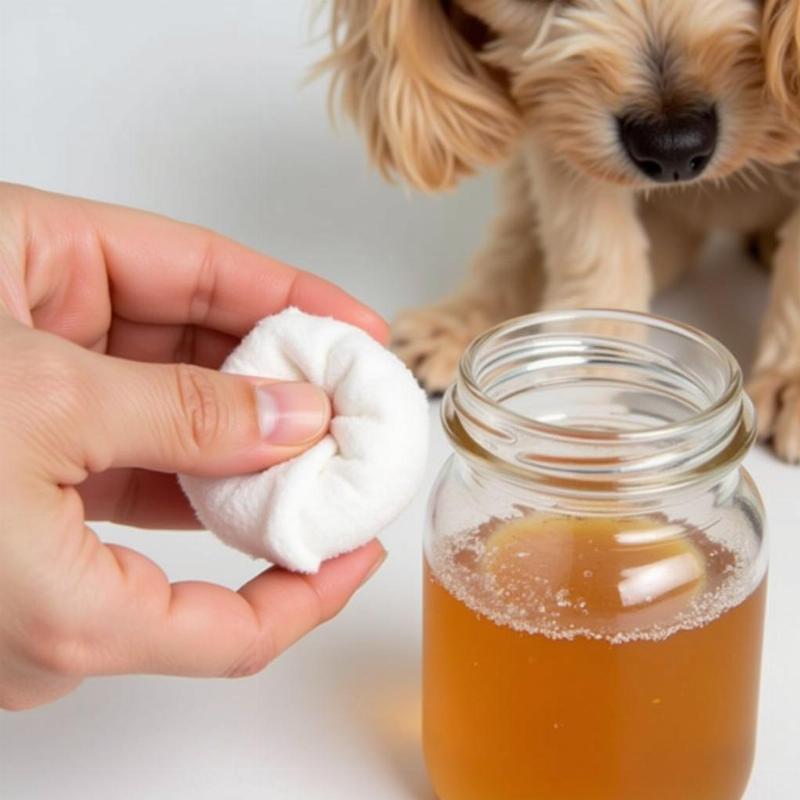Dog skin yeast infections are a common problem, causing discomfort and frustration for both you and your furry friend. Recognizing the signs early and knowing some effective home remedies can make a big difference in managing this pesky issue. This article will explore various dog skin yeast infection home remedies, providing you with practical solutions you can try at home to ease your dog’s itchiness and promote healing.
Understanding Yeast Infections in Dogs
Yeast, specifically Malassezia pachydermatis, is a fungus naturally present on a dog’s skin. However, under certain conditions like allergies, humid weather, or a weakened immune system, this yeast can overgrow, leading to an infection. Common signs include redness, itching, a musty odor, greasy skin, and hair loss. Areas like the paws, ears, and skin folds are particularly susceptible.
Effective Home Remedies for Dog Skin Yeast Infections
Several home remedies can help manage yeast infections, providing relief to your dog and promoting healthy skin. Remember, while these remedies can be effective, consulting your veterinarian is crucial for a proper diagnosis and to rule out other potential skin conditions.
Apple Cider Vinegar: A Natural Antifungal
Apple cider vinegar (ACV) has natural antifungal properties. Dilute ACV with water (1 part ACV to 10 parts water) and apply it to the affected areas with a cotton ball. This can help balance the skin’s pH and inhibit yeast growth.
 Apple Cider Vinegar Solution for Dog Yeast Infection
Apple Cider Vinegar Solution for Dog Yeast Infection
Coconut Oil: Moisturizing and Soothing
Coconut oil contains lauric acid, which has antifungal and antibacterial properties. Applying a thin layer of coconut oil to the affected area can soothe irritated skin and help combat the yeast overgrowth.
Oatmeal Baths: Calming Itchy Skin
Oatmeal baths can provide immediate relief from itching and inflammation. Grind plain oatmeal into a fine powder and add it to lukewarm bathwater. Soak your dog for 10-15 minutes, then rinse thoroughly.
Plain Yogurt: Probiotic Powerhouse
Plain, unsweetened yogurt contains beneficial bacteria (probiotics) that can help restore the balance of microorganisms on the skin. You can apply a small amount of yogurt directly to the affected area.
When to See Your Veterinarian
While home remedies can be helpful, it’s essential to consult your veterinarian if your dog’s symptoms are severe, persistent, or worsen despite home treatment. Your vet can provide a definitive diagnosis, prescribe antifungal medications if necessary, and rule out other underlying conditions.
What if my dog keeps licking the affected area?
Excessive licking can further irritate the skin and hinder healing. An Elizabethan collar can prevent your dog from reaching the affected area.
Can diet affect yeast infections?
A diet high in carbohydrates can contribute to yeast overgrowth. Talk to your vet about a diet that may help manage your dog’s yeast infections.
Conclusion
Dealing with a dog skin yeast infection can be challenging, but with a combination of home remedies and veterinary guidance, you can help your furry companion find relief and regain healthy skin. Remember to always consult your vet for a proper diagnosis and treatment plan. Utilizing these dog skin yeast infection home remedies, along with professional advice, can significantly improve your dog’s comfort and overall well-being.
FAQ
- What are the common signs of a yeast infection in dogs? Redness, itching, a musty odor, greasy skin, and hair loss are common signs.
- Can I use human antifungal cream on my dog? No, never use human medications on your dog without consulting your veterinarian.
- How often should I apply home remedies? Follow your veterinarian’s recommendations or apply as directed on product labels for specific remedies.
- How can I prevent yeast infections in my dog? Keeping your dog’s skin dry, maintaining a healthy diet, and managing underlying allergies can help prevent yeast infections.
- Are yeast infections contagious to humans or other pets? No, dog yeast infections are not contagious.
- How long does it take for a yeast infection to clear up? With appropriate treatment, most yeast infections improve within a few weeks.
- What should I do if home remedies don’t work? Consult your veterinarian for further evaluation and treatment options.
Related Articles You Might Find Helpful
home remedies for dog ear mites vinegar
coconut oil for dogs ear yeast infection
dog yeast infection paws home remedy
grapefruit seed extract and dogs
Beautdogs.us is your one-stop resource for all things dog-related in the US. We offer expert advice on dog breeds, grooming, training, nutrition, and healthcare. Whether you’re a seasoned dog owner or just starting your journey, Beautdogs.us provides reliable information and resources to help you provide the best care for your canine companion. Connect with us for personalized support: Email: [email protected], Phone: +1 501-555-7529. Visit Beautdogs.us today!